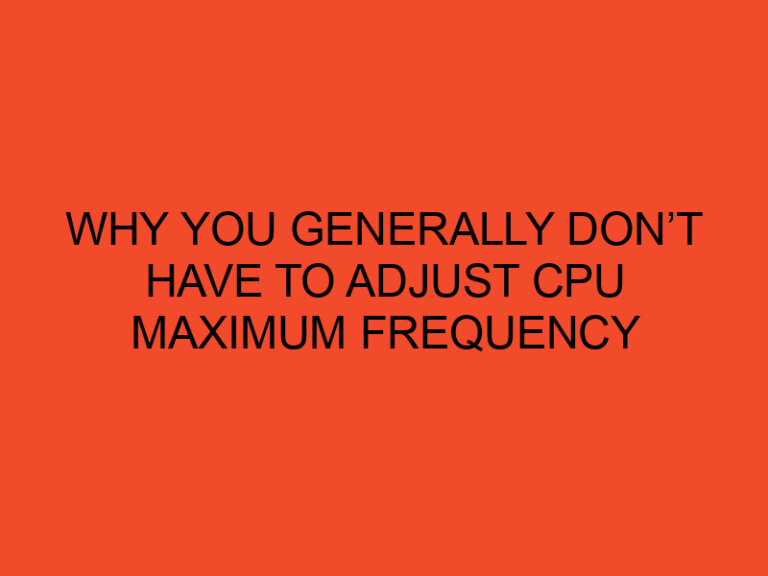When building a new computer or upgrading an existing one, the question of whether to purchase a used CPU often arises. CPUs, or central processing units, are an essential part of any computer, and they can be expensive to purchase new. However, buying a used CPU can come with its own set of risks and drawbacks. In this article, we will explore the advantages and disadvantages of purchasing a used CPU, as well as some things to consider before making a purchase.
Table of Contents
Understanding CPUs and Their Role in Computing
Before we dive into the pros and cons of purchasing a used CPU, it’s important to understand what a CPU is and what it does. A CPU is the primary component in a computer that handles most of the processing tasks. It is responsible for executing instructions and performing calculations, as well as managing data flow between different parts of the computer.
CPUs come in a variety of types and specifications, each with their own strengths and weaknesses. The most common types of CPUs are Intel and AMD processors, which are used in the majority of desktop and laptop computers. When purchasing a CPU, factors such as clock speed, number of cores, and cache size can affect its performance.
Advantages of Purchasing a Used CPU
One of the most significant advantages of purchasing a used CPU is the potential cost savings. CPUs can be expensive, particularly if you are looking for a high-end model. By purchasing a used CPU, you may be able to get a better deal on a processor that would otherwise be out of your budget.
Another advantage of purchasing a used CPU is that you may be able to find a model that is no longer available new. This can be particularly useful if you are building or upgrading an older computer and need a compatible processor. Purchasing a used CPU can also be a more environmentally friendly option, as it reduces waste and extends the lifespan of existing hardware.
Disadvantages of Purchasing a Used CPU
While there are some advantages to purchasing a used CPU, there are also some potential drawbacks to consider. One of the main concerns is the risk of buying a processor that has been damaged or is not functioning correctly. CPUs can be delicate components, and if they are mishandled or exposed to extreme temperatures, they may not work as intended.
Another disadvantage of purchasing a used CPU is that it may not come with a warranty or guarantee. This means that if the processor stops working or malfunctions, you may not be able to get a refund or replacement. Additionally, purchasing a used CPU can be a bit of a gamble in terms of its lifespan. You don’t know how much use the processor has had, or how close it is to the end of its useful life.
Things to Consider When Purchasing a Used CPU
If you are considering purchasing a used CPU, there are some important factors to keep in mind. First and foremost, you should only buy from a reputable seller. This can help minimize the risk of buying a faulty or damaged processor, and it can also give you some peace of mind knowing that you are purchasing from a trustworthy source.
It’s also important to research the specific CPU model you are considering purchasing. Look up reviews and benchmarks to get an idea of its performance, and check the manufacturer’s website for information on the CPU’s specifications and compatibility. This can help ensure that the CPU will meet your needs and work with your existing hardware.
Finally, it’s a good idea to test the CPU once you receive it to ensure that it is functioning correctly. This can include running benchmarks or stress tests to check for any issues with the processor’s performance.
Conclusion
In conclusion, purchasing a used CPU can be a viable option for those looking to save money or find a specific model that is no longer available new.
However, there are some risks and drawbacks to consider, such as the potential for a faulty or damaged processor and the lack of a warranty or guarantee. Before making a purchase, it’s important to research the specific CPU model, buy from a reputable seller, and test the processor to ensure it is functioning correctly.
Ultimately, whether or not it is okay to purchase a used CPU depends on your individual needs and preferences. If you are willing to take on the risks and do your due diligence, buying a used CPU can be a cost-effective and environmentally friendly option. However, if you are looking for a processor with a warranty or guarantee and are not comfortable with the potential risks, purchasing a new CPU may be a better option.
FAQs
- Is it safe to buy a used CPU?
- Buying a used CPU can be safe if you purchase from a reputable seller and do your research. However, there is always a risk of buying a faulty or damaged processor.
- How much can you save by purchasing a used CPU?
- The amount you can save by purchasing a used CPU depends on the specific model and the condition of the processor. Generally, you can expect to save anywhere from 10-50% compared to purchasing the same model new.
- How long do CPUs typically last?
- The lifespan of a CPU depends on a variety of factors, including usage, temperature, and manufacturing quality. In general, a CPU can last anywhere from 3-10 years or more.
- Can you upgrade a used CPU?
- Yes, you can upgrade a used CPU as long as it is compatible with your motherboard and other hardware components.
- Should I purchase a used or new CPU?
- Whether to purchase a used or new CPU depends on your individual needs and preferences. Consider factors such as cost, performance, warranty, and environmental impact before making a decision.






